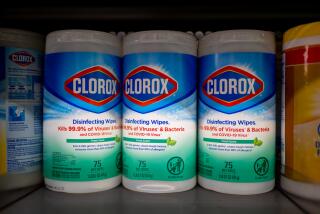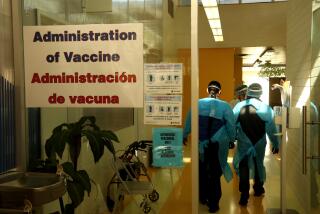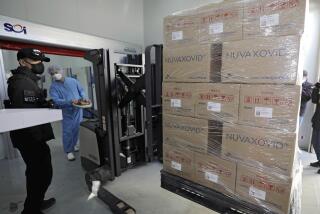Chiron Flu Shots Delayed by Impurities
Chiron Corp.’s stock sank 8.6% on Friday on news that the Emeryville, Calif., company expected to destroy as many as 4 million tainted flu shots and delay shipping uncontaminated vaccine.
U.S. health officials said they didn’t anticipate a vaccine shortage for the coming influenza season despite the contamination disclosed by the world’s second-largest maker of flu vaccine.
Shares of Chiron fell $4.08 to $43.41 on Nasdaq. Chiron had disclosed after the close of trading Thursday that some of its vaccine, Fluvirin, had failed to “meet product sterility specifications.”
Chiron Chief Executive Howard Pien said the company expected to deliver 46 million to 48 million doses beginning in October, roughly a month later than usual, pending the results of an investigation. Pien said that human error might be to blame for the contamination, describing it as “our leading hypothesis.”
“We are not going to release any product ... until we are absolutely certain we know the reasons why a small number of lots failed to meet the standards,” Pien said in an interview.
The change in Chiron’s delivery schedule is not expected to cause a vaccine shortfall, said Julie Gerberding, director of the U.S. Centers for Disease Control and Prevention.
Gerberding said she anticipated that more than 100 million doses of vaccine would be available this flu season.
“Ultimately all people who need flu vaccines should be able to get their shots and can be protected,” Gerberding said. The elderly and healthcare workers are among those at high risk for contracting the flu and are advised to get vaccinated.
Chiron entered the U.S. flu business a year ago with the acquisition of PowderJect Pharmaceuticals of Oxford, England, making Chiron one of this country’s two primary flu vaccine makers.
The other maker of flu vaccines, Aventis Pasteur Inc., said Friday that it expected to deliver 52 million doses for the coming flu season, 9 million doses more than last year. Both companies increased their production of flu vaccine this year.
But Chiron’s delayed delivery schedule puts it at greater risk of being saddled with unused doses if the demand for shots is not as brisk as expected, said Geoff Porges, an analyst with Sanford C. Bernstein & Co. In addition, the flu-shot revenue Chiron had anticipated in the last two quarters of the year will now come largely in the fourth quarter, Porges said.
“Investors are going to be chewing their nails to see if the little engine that could can get up the hill in the fourth quarter,” he said.
Chiron said it expected to meet the low end of its 2004 earnings guidance of $1.80 to $1.90 a share, assuming an October release of its vaccine.
The contamination discovery could produce additional problems for Chiron, including increased costs to retest existing vaccine and to expedite its delivery, said Aaron Geist, an analyst with Robert W. Baird & Co.
“It does create uncertainty and risk in the short term,” said Geist, who lowered his rating of the company from perform to neutral.
More to Read
Inside the business of entertainment
The Wide Shot brings you news, analysis and insights on everything from streaming wars to production — and what it all means for the future.
You may occasionally receive promotional content from the Los Angeles Times.










